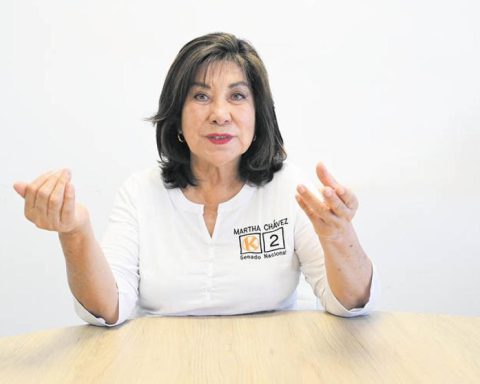
Although at some point it was thought that the choice of profiles to fill the 39 undersecretaries had to do only with the technical nature of the candidates offered by the parties of the future ruling party and independents, the presentation of those who are going to act as heads of portfolio in the incoming Government, two weeks ago, added a more than complex edge, although natural in this type of decision, such as the consideration of the representation quotas of the (in this case) pro-government conglomerates.
As usually happens with each incoming administration, and prior to the appointment of its cabinet, it is vociferated without nuance that it is going to govern without political quotation, the one that everyone with microphone in hand repudiates, linking it to one of the old and bad practices of the national politics. It was done in recent years both in the governments of former President Michelle Bachelet, and in that of the current head of state, Sebastián Piñera. Now it was the turn of President-elect Gabriel Boric, who, like his predecessors, had to bite his tongue when putting together the complex puzzle.
The truth is that in order to achieve minimum levels of internal governability, the balance of powers, according to the representation or strength of each of the parties or movements that politically support a government, is absolutely necessary, since no one wants to feel overwhelmed by a power of lower drag, considering the technical, political and economic wear that is made in the campaigns and then when arriving at La Moneda.
The clearest example of error in this aspect can be found in the current Government. From the beginning, both the UDI and the RN fought every inch for the designations. Seeing himself at a disadvantage, considering his greater parliamentary representation, RN did not hesitate to point his darts at the head of the second floor, Cristián Larroulet, whom he constantly accused of choosing one side to the detriment of the other. President Piñera also had a hard time when he decided to hand over to Evópoli –the party with the least representation– the two most important portfolios, such as Interior and Finance. At that time, the UDI made life impossible for them and unceremoniously, until they managed to unseat the chief of staff, Gonzalo Blumel.
On this occasion, it was the turn of the President-elect to experience it firsthand, who, once he presented his ministers, experienced the first tensions that were generated within Approve Dignidad (AD), whose different forces were not satisfied with the designated quotas . All this framed in the architectural change of power used by the elected Head of State, having included the New Social Pact in the conformation of his Government, but even more, having given a chair in the political committee to the Socialist Party (PS).
In this way, and prior to the alarm raised in the conglomerate, the cabinet had two representatives of the Socialist Party, plus two pro-PS independents – from the party headed by Álvaro Elizalde they showed off their four quotas. The other forces that obtained the most power were Social Convergence –the President’s party–, with five representatives, then the Communist Party, which considers the largest bench within AD and which obtained only three seats; in the case of RD, two spaces were assigned; and one for both the regionalists and the Commons.
More for the DR, Social Convergence and the PC
Although the undersecretaries are not spaces to reward or rebalance forces, as they constantly repeated, sources within Approve Dignidad recognized that this was a transcendent factor, considering internal governance. Transversely, they agreed that the chosen profiles were the right ones to take charge of the designated tasks, and that the elected president was reiterated “full freedom” to choose those who he considered could best fulfill the assigned role. However, privately, several parties acknowledged some discomfort with the relevant presence of CS and PS (being a “guest” party). Among them, in Democratic Revolution (RD), where -in the opinion of some of its militants- they had been diminished in the ministries, so it was expected that this “balance” of forces would occur in this past, and thus lights were delivered In the past week.
In this way, the party that obtained the most sub-secretaries was the DR, with nine positions –considering that of Javiera Martínez, who assumes in Dipres–, plus two independents who previously competed for popular election positions in DR quotas. Among the names is that of Miguel Crispi, who was one of the first to meet last week.
In the case of Social Convergence, there were 6 undersecretaries added to the 5 ministries. But this did not leave everyone happy, because within AD some continue to see an “unequal contest”, with an evident hegemony of CS and RD, compared to Comunes and other movements, such as Unir (by Marcelo Díaz), which did not have designations neither in ministries nor in undersecretaries, and also with a presence of parties such as the PS and the PPD similar to that of Approve Dignity parties, which are part of the DNA of the next government, as is the case of Comunes. In fact, from one of the AD leaders they assured that, with this, the cabinet was “unbalanced” and that “it was ugly” that some movements and parties that will be key to implementing the government program were left out.
Some lights delivered the president of Comunes, Ka Quiroz, who lamented the minority presence of her group in the cabinet. “Regarding the recent appointments, we value the presence of the AD parties in the undersecretaries. We regret that the capacities that we have made available as a party have not been considered to a greater extent, but we understand that the decision is exclusive to the government team and For this reason, and as we have been doing, we will seek to continue contributing to materialize the program, which is ultimately the most important thing,” he said.
In the case of the Communist Party, a store that had not been satisfied either, it received six appointments in sub-secretaries that are well valued by the community. As for Comunes, although there are two names assigned to its ranks, such as Haydee Oberreuter in Human Rights and Giorgio Boccardo in Labor, the latter was not proposed by the party. The Social Green Regionalist Federation (FRVS) also obtained two quotas –one of them in the Undersecretary of Agriculture, sharing a portfolio with Minister Esteban Valenzuela, of the same party–, while Acción Humanista kept one. In the case of the independents who had not previously run for ruling parties, there are seven. In this way, the idea of giving the cabinet a seal outside the traditional forces is maintained.
In the case of the members of the New Social Pact, the PS was left with two appointments, and the PPD with the same number. Until now, the Radical Party has been left out of any designation, something that some members of the community viewed with concern, alluding to the fact that, although they supported Boric without conditions, gestures always matter, as was done with the PS and the PPD. , especially when it comes to feeling part of a project in Congress.
Once the cabinet was closed, the concern was installed on how they are going to manage to bring the Christian Democracy closer, especially at the legislative level. This is because from the phalanx they have expressed a high degree of disenchantment with the treatment that they accuse they have received. Even representatives of Approve Dignidad confessed that they expected a wink in this pass, but in the end it was not, which would risk opening a flank with a party that could be fundamental in votes in Parliament. “In Congress it’s not enough for us. We’re counting the DC but they don’t give it anything. It’s going to be complex,” stressed an AD leader.
For now, the only name that could be considered closer to the DC is that of Macarena Lobos, who was one of the coordinators of the Yasna Provoste presidential campaign. She is independent, but close to the Christian Democracy and unsuccessfully competed as a constituent candidate in the pact of Non-Neutral Independents. She will assume the Undersecretariat of the Segpres. In any case, there is still an instance, such as the appointment of presidential delegates and seremis, where some hope that gestures can be made towards those who were left out of the cabinet.
In the undersecretaries, the principle of parity was maintained, with 19 women and 20 men, intergenerational, with people with previous political experience in some positions, as well as former candidates for elected positions.

















